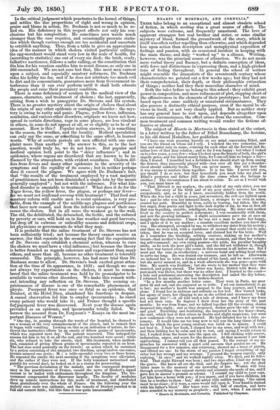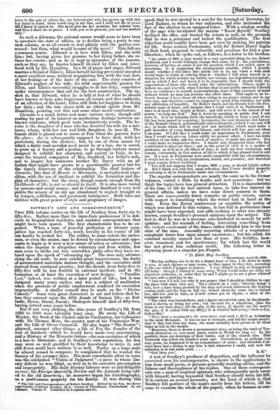HEARTS IN ILORTMAIN, AND CORNELIA..
TEraz tales belong to an exceptional and almost obsolete school of fiction, in which writing was a great source of effect. The subjects were extreme, and frequently unnatural. The love of apparent strangers but real brother and sister, or some similar mystery of blood, formed the groundwork of the story, which in itself was often rather repelling than otherwise, and which depended less upon action than description and metaphysical exposition of feelings and passion, with an occasional incident in keeping with the main theme, and duly "worked up" to a climax. Writing, however, was the principal source of attraction. We do not mean mere verbal finery and fluency, but a definite conception of ideas, with force and distinctness in expressing them, and. a high-pitched tone of feeling throughout. In general the school of writers might resemble the dramatists of the seventeenth century whose characteristics we pointed out a few weeks ago ; but they had not their comprehension' their depth, or their philosophic estimation of things ; neither had they their masculine character of mind.
Both the tales before us belong to this school : they exhibit great power in composition, and more refinement of plot, stopping short of the offensiveness in the elements of their prototypes ; but they are based upon the same unlikely or unnatural circumstances. They also possess a distinctly ethical purpose, even if the moral be ob- vious in itself, or not very clearly applied. But as neither story has any general base to rest upon, and depends altogether upon extreme circumstances, the effect arises from the execution. Com- mon treatment and common writing would render the fictions of- fensive or absurd.
The subject of Hearts in Ilfortmain is thus stated at the outset, in a letter written by the father of Ethel Beauchamp, the heroine, to his old friend Hamilton, her godfather. "I have one wish pressing heavily on my mind concerning Ethel, and you are the friend on whose aid I rely. I watched the two yesterday, bro- ther and sister only in name, evincing for each other all the fervent and fa- miliar love of that dear relation ; and so far I was happy : but when I looked on to a few years, a very few—when I looked upon the beauty of both, the girl's angelic grace, and his almost manly form, for I can call him no longer ahoy— then I feared. I trembled lest a forbidden love should start up from among the flowers they innocently played with—lest over all this joy a thunder- cloud should suddenly break. They can never marry. Say not now, that it was unwise to nurture them together. It is too late. I never told you, nor should I do so now, but that henceforth you must take my _place as Ethers protector and father (till the time comes when she belongs to another.) The circumstances I am about to relate. To act as I would wish you, you must know all. "That Edward is my nephew, the only child of my only sister, you are aware. The story of his birth and of my poor sister's sorrows has been scrupulously, and, as far as I know, successfully hidden front the world. When she was but a child in years, just seventeen, the evil eye lighted upon her ; and he who won her innocent heart, a stranger to us even in name, crossed her path. Beautiful in form, noble in bearing,. but fallen, like the lost angel, from purity and light to the dark depths of sin, he was at first all that was beguiling, amiable, intelligent, fascinating. My. sister and mother lived in the country in perfect retirement; I was occasionally with them, and saw the growing intimacy. A slight acquaintance gave me at once an insight into his character. I knew he was not a man to make her happy, and I spoke of it to my mother ; a sensible excellent mother you know she was. She attempted, seconded by me, to withdraw my sister from his society; and then we were told, with a confidence of manner that could not be mis- taken, that he was an accepted lover, and claimed her for his bride. Well do I remember the blushing, sobbing creature, sinking on her mother's breast—that mother's look of anguish for one moment, and then her return- ing self-command : my own rising passion—his pride, his peculiar haughty smile, as he took the poor girl's hand, and she did not withdraw it, though her face was turned away—the scene at this moment is all before me. But I must put the rein on recollection ; a nervous hand and aching head refuse to serve me long. He was denied our treasure, and he left us. Afterwards we induced her to write a formal refusal of his hand, and we were content ; but she never seemed so and in a week afterwards she was gone—gone with him. My search was fruitless _.; but she wrote to her mother that they were married, and going abroad. The letter was hasty, blotted with Sears; the post-mark was Dover, but there was no other date. I hurried to the coast- s lady and gentleman answering the description had sailed the day before. I returned to my mother; she was broken-hearted. "In a few months another letter came. They were in Paris, my poor sisterillandsad, and she conjured US to write. I set out immediately to go to her; my mother's health was unequal to the long journey, and I went alone. I found her in sickness and solitude on her bed. Her wasted looks, her agony of tears, her clinging to me as she sobbed and murmured, 'I did not expect this ! '—it all told such a tale of distress, and I knew my fears had not been vain. By degrees I drew from her the story of the past months : he was from home, and we talked together till the evening shades deepened into night ; and as they deepened, darker grew the tale of wrong and grief. Trembling and hesitating, she imparted to me her fears—fears, she said, which had at first arisen in doubts and slight suspicions, but were now confirmed—they were not married. He had deluded her by a false ce- remony. It would take me too long now to tell you the long tissue of false- hoods by which the poor young creature was lured on to misery. I could not bear it. I bade her hush, I clasped her in my arms, and wept with her ; and then bidding her be calm and try to rest, and saying I would return to her, I rushed from the house into the open air. I felt choking with sorrow, indignation, anger, and scorn for the deceiver. At that moment I saw him approaching. I cannot tell you all that passed. To the torrent of my re- proaches he answered with a quiet cold sarcasm that goaded me on. He disappeared for a few minutes, and returning, showed me a brace of pistols, and offered me one. In the storm of my passion I forgot everything of my sister but her wrongs and my revenge. I grasped the weapon eagerly, only replying, 'At once l' and we walked raphlly away. We fired, and he fell-.— dmd. That night Edward was born; and two days after, I laid my sister m the grave. She knew all ere she died, and she forgave me ; yet she shed bitter tears to the memory of one unworthy of her. Women will love through everything. One request sternly and solemnly she made of me, and I gave her in answer a promise as solemn. I commit my child to your care. Let him. have a home with you ; if you marry, and if you have children, let him be a brother to them : but,' she added with sudden enagy, 4 the union. must be no closer; if it were, a curse would fall upon it. Your handle stained with his father's blood.' Her tones were wild, full of emotion, and have since sounded in my memory as prophetic ; and now, when I am about to
• Hearts in Hortmain, and Cornelia. Published by Chapman. leave to the care of others the one beloved girl who has grown up with this boy hand in hand, those words ring in my ears, and I shall not die in peace
till I know it cannot be. She must gave me her promise, her solemn vow, and then I shall die in peace. I wish you to be present, you and her mother only."
In such a dilemma, the rational course would seeni to have been to ascertain the state of affairs, or to decline being a party to any
inch sehenve, or at all events to deal plainly with the parties con- cerned: but then, what would become of the novel ? This follows a zommon course. Edward is in love with Ellen, and she with
him ; but, having given her promise to her dying father, she re-
fuses her cousin ; and as he is kept in ignorance of the reasons, such as they are, he fancies himself ill-used by Ellen and inter- fered with by Mr. Hamilton. In a fit of pique and finger, Edward
marries a friend of Ellen's • Ellen herself having previously accepted a most excellent man, without acquainting him with the real state
of her feelings or of the facts of the ease. The story consists of
Edward's neglect of his wife, his wild ungovernable passion for 'Filen, and Ellen's successful struggles to do her duty, sometimes
under circumstances that call for the best construction. The up- shot is, that Edward, when he is told at last of what he should. have known at first, asks forgiveness all round, and dies suddenly,
of an affection of the heart ; Mien stall finds her happiness in doing her duty ; and the tale doses with an ethical epistle from Mr. Hamilton, pointing out this and some other moral conclusions. Camelia is a much better and more various story, though still resting for part of its interest on mysterious feelings between un-
knowa relations, which good taste instinctively avoids. The he- roine is the daughter of a man who has deserted his wife for a mis- tress; whom, with her son and little daughter, he uses ill. The female child is placed out to nurse at Pau when the parents leave the place ; she is subsequently supposed to have died, with her protectors, during the cholera; but, by one of those means for which a fairly read novelist need never be at a loss, she is saved, to grow up a beauty and a genius, to go through various scenes designed to exhibit her character, and society in Italy, to be-
come the trusted companion of Mrs. Sandford, her father's wife, and to inspire her unknown brother Mr. Darcy with an af- fection that might have grown to a questionable passion but for the timely discovery of the relationship. The chief feature of Cornelia -him that of Hearts in Hartman!' is metaphysical e sition, with the use of incident to exhibit the formation and
play of character ; but the story, though remote enough from the likelihoods of life, is not so absurd in itself. It is also more varied.
by persons and social scenes ; and in Colonel Seaford it very well mmts the misery of an old age abandoned to neglect brought on by temper, se118 aliness, and passionate indulgence. Both es are written with great power of styleand. pregnancy of images.



























 Previous page
Previous page